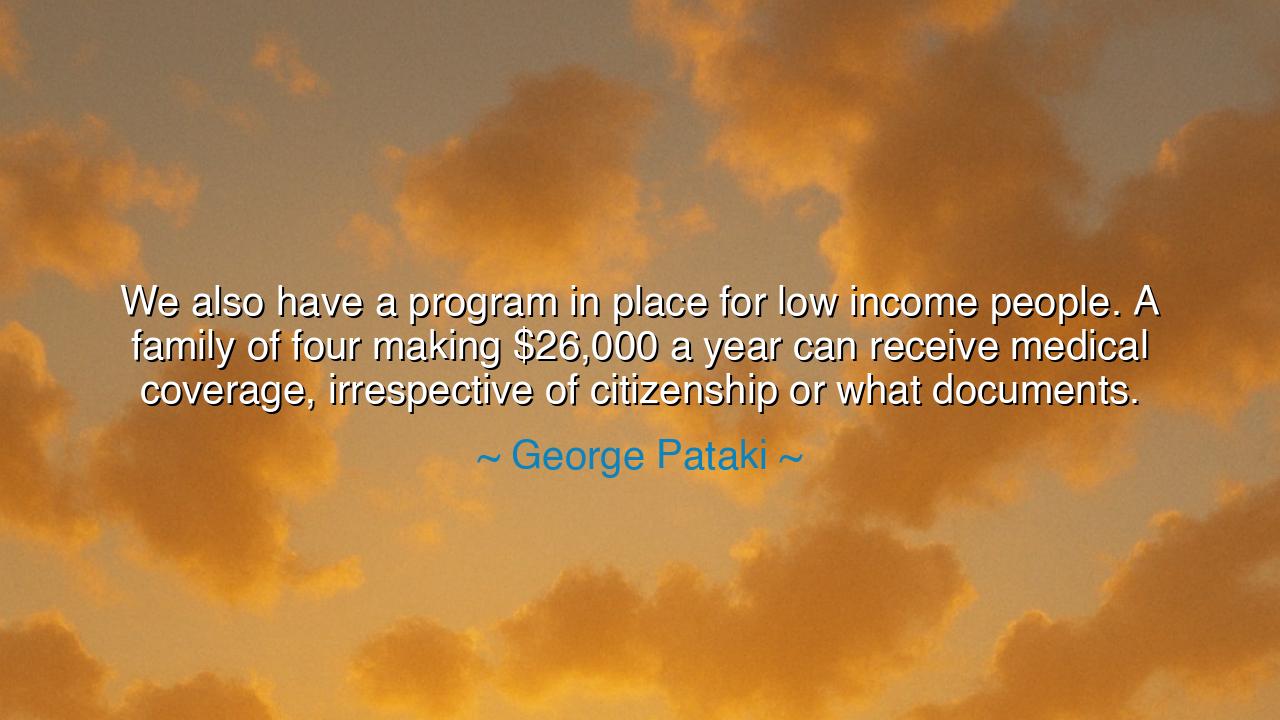
We also have a program in place for low income people. A family
We also have a program in place for low income people. A family of four making $26,000 a year can receive medical coverage, irrespective of citizenship or what documents.






In the words of George Pataki we hear a call to mercy, a reminder that compassion can be woven into the very fabric of governance: “We also have a program in place for low income people. A family of four making $26,000 a year can receive medical coverage, irrespective of citizenship or what documents.” At first glance, it is a statement of policy, a technical description of aid. But when read with the eyes of the heart, it is a declaration that the worth of a human being is not measured by wealth, nor by papers, but by the simple dignity of being alive and in need.
The focus on low income people is central to this wisdom. For throughout the ages, the poor have always stood most vulnerable to suffering, most exposed to the storms of illness and accident. A man with riches can buy medicine, but a man with little may be left to fate. Pataki’s words reveal an effort to correct this imbalance, to make provision for those who would otherwise be forgotten. The greatness of a society is not in how it treats its powerful, but in how it tends its weakest. Thus, this program becomes not only a political act, but a moral one.
The mention of a family of four making only $26,000 a year makes the teaching personal. It is not an abstract ideal, but a vision of flesh and blood: parents laboring daily, children growing, all of them living with the fear that one illness might bring ruin. By providing medical coverage, the state becomes not a distant authority but a shield for such families, ensuring that life’s hardships do not become unbearable tragedies. It is in this act that governance rises from rule to service, from power to stewardship.
Even more striking is the phrase “irrespective of citizenship or what documents.” Here is the echo of ancient laws of hospitality, found in cultures across the world, where the stranger was to be cared for as if kin. In the desert traditions of the Middle East, to deny water or food to a traveler was a sin. In the Christian parable of the Good Samaritan, the true neighbor was not of the same tribe but the one who showed mercy. Pataki’s words stand in this lineage: the recognition that healing and compassion should not stop at borders, nor be chained by papers, for illness recognizes no nationality, and mercy should recognize none either.
History bears this out. In the great plague of the 14th century, some cities that opened their gates to all the afflicted, foreign or native, were remembered for their humanity, even as others turned strangers away to perish in the fields. In modern times, organizations like the Red Cross and Doctors Without Borders have carried this same spirit, serving all regardless of nation, creed, or identity. Pataki’s program, though spoken of in modern America, echoes this timeless tradition of boundless care.
The lesson is plain and powerful: the measure of true civilization lies in whether we extend compassion beyond ourselves. Families struggling to survive need not only wages, but protection; they need to know that their children will not be abandoned in times of sickness. For each of us, this wisdom carries a practical charge: to see beyond the boundaries of wealth, nationality, or legality, and to recognize the humanity in all. Where you have means, offer help. Where you have influence, support policies that lift up the struggling. Where you see a stranger in need, remember that they too are someone’s child, someone’s parent, someone’s kin in the family of humankind.
Therefore, take Pataki’s words as more than politics; hear them as an echo of the ancient covenant of humanity. Build programs in your own life—whether through community, charity, or personal kindness—that ensure the vulnerable are not left alone. For in lifting them, you not only save their lives—you honor your own soul. And the day will come when future generations will judge us, not by the walls we built nor the wealth we gathered, but by the mercy we showed to the least among us.






AAdministratorAdministrator
Welcome, honored guests. Please leave a comment, we will respond soon